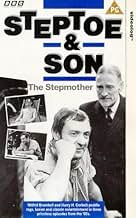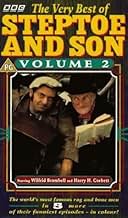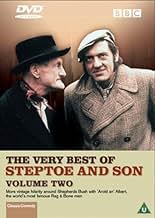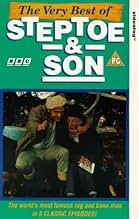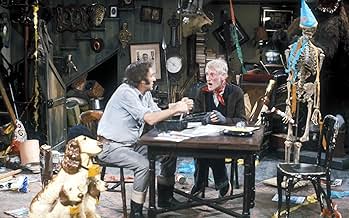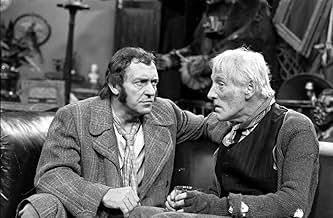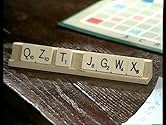Ajouter une intrigue dans votre langueBritish sitcom about a father-and-son rag-and-bone business in London. The intergenerational divide between the miserly Steptoe and his ambitious son results in comedy, drama, and tragedy.British sitcom about a father-and-son rag-and-bone business in London. The intergenerational divide between the miserly Steptoe and his ambitious son results in comedy, drama, and tragedy.British sitcom about a father-and-son rag-and-bone business in London. The intergenerational divide between the miserly Steptoe and his ambitious son results in comedy, drama, and tragedy.
- Récompenses
- 2 victoires au total
Parcourir les épisodes
Avis à la une
I love this type of simple comedy. No complicated stories or phrases or lines. I'm a young'un myself, growing up in such a degraded and unfunny society, so it's nice that a show that's pushing 70 years old is perfectly capable to make me genuinely laugh. As I said before, this level of simple comedy keeps me coming back, and I'm often quoting the show around people who have no idea what I'm talking about. For it's time, Steptoe was the most vulgar, offensive show on the box, yet is now considered the "elder statesman" by some today. I find it's not repeated on TV enough, with Divided we Stand being repeated on BBC Four only last October. Yet BBC Three is ok with repeating Bad Education's Christmas Special three times in one night. In conclusion, Steptoe was ahead of its time, portraying a very grim and off-beat picture of working class life.
This is a BBC sitcom that's set in Shepherd's Bush, West London. It's about a father and son who are rag-and-bone men. It ran from 1962-1974. There were also films, plays, documentaries and versions of the TV series made by other countries.
It's well-written and well-acted. There are many good performances from actors who only appear in one or two episodes each.
It's well-written and well-acted. There are many good performances from actors who only appear in one or two episodes each.
Steptoe & Son (SS), was a national institution back in the 60s & 70s. There were huge TV audiences all clamouring to watch the latest episode in the lives of two lonely but dependent rag & bone men in Sheperds Bush, London.
So big were the audience figures at around 7pm at night that even the-then Prime Minster, Harold Wilson, had to postpone a General Election campaign because it clashed with this hugely popular show.
Harold is the middle aged son, frustrated with his boring job as a "totter" and being constantly tied down by his irritating and manipulating father.
Harold is a dreamer, a person who sees himself as an intellectual, a poet, an classical actor, a gentleman, a ladies man and sucessful businessman....and yet this is just his little dream, the kind of dream we all wish for. But in Harold's mind only his father is really holding him back from making those dreams a reality.
Albert, on the other hand, has seen it all. He is a bitter old man who was brought up in a poor family and life was tough, especially having to suffer going through two world wars. He also realises that he never made a success of his life in a business sense. After decades of being a rag & bone man he is still no richer than his own father was.
But to add to this bitterness, he is also scared of being left totally alone in an uncaring modern world. He no longer has a wife, no daughters, hardly any family at all to fall back on. The only person he can really trust & depend on is his son, Harold. And Albert will do anything to ruin Harold's chances of either bettering his own life elsewhere or making sure he never leaves him to fend for himself.
And so for the next 12 years British audiences peeked into the daily lives & scrabbles of this odd couple with Harold trying to escape to a better world and Albert making sure he doesn't.
The scripts remained consistantly good throughout this era of new comedy. Boundaries of acceptable taste during this time were pushed ever further and the onset of moderately bad language from these two gents became common place.
Some purists saw it as vulgar, crude and the thin end of the cultural wedge, while the majority felt it was nothing more than how life in the real world is portrayed, and that is probably one reason why it was so successful, because we could all empathise with the two characters as they struggle for their own particular hopes & dreams.
It should be added that in real life both lead actors, Wilfred Brambell & Harry H Corbett slowly began to hate each other just as much as the characters they portrayed in the show. Brambell was very much a refined gentleman in real life and usually was very dismissive of the poor and working class (which is the great paradox of his own character).
At the same time Harry H Corbett felt he had become for-ever typecast with this Harold Steptoe millstone. He was desperate to do serious acting or to return to the theatre, but the roles he recieved were little more than Harold Steptoe by any other name. And as a consequence Harry would never get the chance to try new challenges and would always be associated and thought of as Harold.
So there was lots of real bitterness in the latter years of the show, in fact some of the episodes were too close to the bone for some. There was an episode, for example, where Harold was given the starring role in an amateur play and for once he had high hopes of breaking away from the shackles of his present employer, only for the ever sceptical Albert to tell him that he will never be a real actor because he has no talent, no class, no skill, nothing at all in fact. You could almost sense the real hostility behind those masks when Albert confronted Harold.
But for all that, SS on its own, is still a much loved show and often repeated and still remains as fresh & funny as ever. The less said about the two movie spinoffs the better.
****/*****
So big were the audience figures at around 7pm at night that even the-then Prime Minster, Harold Wilson, had to postpone a General Election campaign because it clashed with this hugely popular show.
Harold is the middle aged son, frustrated with his boring job as a "totter" and being constantly tied down by his irritating and manipulating father.
Harold is a dreamer, a person who sees himself as an intellectual, a poet, an classical actor, a gentleman, a ladies man and sucessful businessman....and yet this is just his little dream, the kind of dream we all wish for. But in Harold's mind only his father is really holding him back from making those dreams a reality.
Albert, on the other hand, has seen it all. He is a bitter old man who was brought up in a poor family and life was tough, especially having to suffer going through two world wars. He also realises that he never made a success of his life in a business sense. After decades of being a rag & bone man he is still no richer than his own father was.
But to add to this bitterness, he is also scared of being left totally alone in an uncaring modern world. He no longer has a wife, no daughters, hardly any family at all to fall back on. The only person he can really trust & depend on is his son, Harold. And Albert will do anything to ruin Harold's chances of either bettering his own life elsewhere or making sure he never leaves him to fend for himself.
And so for the next 12 years British audiences peeked into the daily lives & scrabbles of this odd couple with Harold trying to escape to a better world and Albert making sure he doesn't.
The scripts remained consistantly good throughout this era of new comedy. Boundaries of acceptable taste during this time were pushed ever further and the onset of moderately bad language from these two gents became common place.
Some purists saw it as vulgar, crude and the thin end of the cultural wedge, while the majority felt it was nothing more than how life in the real world is portrayed, and that is probably one reason why it was so successful, because we could all empathise with the two characters as they struggle for their own particular hopes & dreams.
It should be added that in real life both lead actors, Wilfred Brambell & Harry H Corbett slowly began to hate each other just as much as the characters they portrayed in the show. Brambell was very much a refined gentleman in real life and usually was very dismissive of the poor and working class (which is the great paradox of his own character).
At the same time Harry H Corbett felt he had become for-ever typecast with this Harold Steptoe millstone. He was desperate to do serious acting or to return to the theatre, but the roles he recieved were little more than Harold Steptoe by any other name. And as a consequence Harry would never get the chance to try new challenges and would always be associated and thought of as Harold.
So there was lots of real bitterness in the latter years of the show, in fact some of the episodes were too close to the bone for some. There was an episode, for example, where Harold was given the starring role in an amateur play and for once he had high hopes of breaking away from the shackles of his present employer, only for the ever sceptical Albert to tell him that he will never be a real actor because he has no talent, no class, no skill, nothing at all in fact. You could almost sense the real hostility behind those masks when Albert confronted Harold.
But for all that, SS on its own, is still a much loved show and often repeated and still remains as fresh & funny as ever. The less said about the two movie spinoffs the better.
****/*****
One of the saddest sights I ever saw on television was Wilfrid Brambell, close to tears on 'Nationwide' in 1982 following the sudden death of his 'Steptoe & Son' co-star Harry H.Corbett. The pairing of these great actors, combined with some wonderful scripts by Ray Galton and Alan Simpson, made 'Steptoe' a classic. I think viewers recognised the truthfulness of the situation; rag and bone man Harold desperately wanted to escape from his father's domination to begin a new life on his own, but couldn't because he loved the old man too much. When searching for comedy ideas, today's writers fall into the trap of thinking: "How can I shock the public?". 'Steptoe' did not set out to shock, yet did because it was so real. After a successful run in the '60's, it was revived in the '70's in colour, and these episodes are my favourites, particularly 'Divided We Stand' in which Harold and Albert tried to lead separate lives in the same house. The word 'timeless' is overused these days, but it definitely applies here.
I am an American who has only discovered the marvelous 'Steptoe & Son' British television series many years after it originally aired. I have managed to watch just about every episode that is available on you tube. I highly recommend this television classic. There were numerous episodes that made me want to cry. The death of their horse Hercules was virtually unbearable, as well as the one where Harold had Albert placed in a old folks' home. The love-hate relationship of the father and son junk company team is more intense than anything ever seen on American television. Although I feel very sorry for Harry being trapped in a world he never made, I find Albert the more appealing of the two. I also can understand the old man's accent more than the son's.
Le saviez-vous
- AnecdotesWilfrid Brambell was only 49 when he began playing Albert Steptoe, who was supposed to be 63 when the series began.
- GaffesThe physical positioning of the Steptoe's outside toilet varies over the course of the series: sometimes it is plumbed in facing the yard gates, at other times it's rotated to face the wall.
- Citations
[repeated line]
Harold Steptoe: You dirty old man!
- ConnexionsAlternate-language version of Stiefbeen en zoon (1963)
Meilleurs choix
Connectez-vous pour évaluer et suivre la liste de favoris afin de recevoir des recommandations personnalisées
Détails
- Date de sortie
- Pays d’origine
- Langue
- Aussi connu sous le nom de
- Степто и сын
- Lieux de tournage
- Stable Way, Kensington, Londres, Angleterre, Royaume-Uni(Junkyard exteriors)
- Société de production
- Voir plus de crédits d'entreprise sur IMDbPro
- Durée45 minutes
- Couleur
- Mixage
- Rapport de forme
- 1.33 : 1
Contribuer à cette page
Suggérer une modification ou ajouter du contenu manquant

Lacune principale
By what name was Steptoe and Son (1962) officially released in India in English?
Répondre
